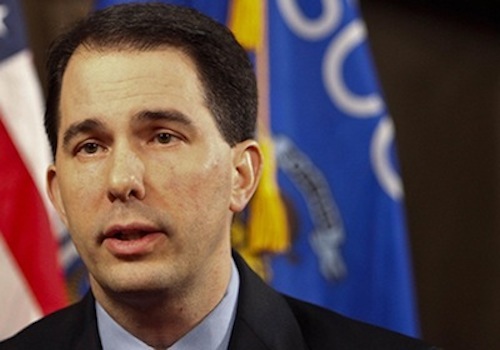Submitted by Brendan Fischer on
 Supporters of Gov. Scott Walker have been working hard in recent weeks to conjure up excuses to dismiss the John Doe campaign finance probe.
Supporters of Gov. Scott Walker have been working hard in recent weeks to conjure up excuses to dismiss the John Doe campaign finance probe.
First, they attacked it as a partisan witch hunt, ignoring the fact that the investigation is led by a Republican who voted for Walker and that it has the participation of both Republican and Democratic district attorneys from across the state.
Then, they tried to dismiss it as a "legally baseless" investigation, and argued that Wisconsin law does not prohibit the Walker campaign and Wisconsin Club for Growth from coordinating on electoral "issue ads" that omit the phrase "vote for" Scott Walker.
Now, Walker's allies are acknowledging that the probe is grounded in Wisconsin law, but are claiming that prosecutors are enforcing a "zombie law" — allegedly rendered unenforceable by the U.S. Supreme Court — that the Walker campaign was purportedly free to ignore.
This is not the case.
The governor is endowed with many powers, but he cannot single-handedly rewrite the law or reverse legal precedent.
For decades, Wisconsin law has capped campaign donations to limit the influence of money in elections, and required candidates to disclose major contributions so the public can see who is bankrolling our politicians. Courts have interpreted the law to mean that "issue ads" coordinated with a candidate for state office can be regarded as in-kind contributions to the campaign, because they are of great value to the campaign. Any coordinated issue ad "contributions" that exceed donation limits and are omitted from campaign filings can be illegal. The same is true in federal elections, under federal law.
Even if the Walker camp believed that coordinated issue ads shouldn't be regulated, or that at some point in the future a court might overrule existing Wisconsin precedent, this belief shouldn't have given them license to ignore well-established law during the 2012 elections, as the prosecutors' theory in the case alleges.
The U.S. Supreme Court has never held that counting electoral issue ads as contributions is unconstitutional. In fact, in 2003 the court explicitly upheld a provision of the McCain-Feingold Bipartisan Campaign Reform Act that treats issue ads that air near federal elections (called "electioneering communications") as in-kind contributions if coordinated with a candidate. That holding has never been overturned.
And, even as a slim majority of the U.S. Supreme Court has chipped away at campaign finance limits for PACs and non-profits, it has done so with the express proviso that these groups are "independent" and their activities not coordinated with candidates.
Conservative Supreme Court Justice Anthony Kennedy explained in Citizens United vs. FEC that "the absence of prearrangement and coordination...undermines the value of the expenditure to the candidate." In other words, if a candidate is coordinating with a third-party group, that group's expenditures are of value to the campaign — and the contribution limits and disclosure requirements that apply to candidates would be rendered meaningless if politicians can work closely with a group that takes secret, million-dollar donations.
Wisconsin courts have had a similar take, and the John Doe prosecutors are relying on an interpretation of state law established by the Wisconsin Court of Appeals in 1999, in a precedent-setting case called Wisconsin Coalition for Voter Participation.
In that case, the court rejected arguments identical to those now being made by Walker and the Club for Growth, and held that, under Wisconsin law, electoral issue ads coordinated with a campaign count as contributions to the campaign.
Despite the claims of op-ed writers published by the Journal Sentinel, it is not the case that the courts had overturned the Wisconsin Coalition for Voter Participation precedent or rendered its holding unenforceable in advance of the recall elections. Just ask Wisconsin's Republican Attorney General, J.B. Van Hollen. As thousands of people were occupying the Wisconsin capitol in 2011 — sparking a movement that would lead to the recall elections — Van Hollen was citing Wisconsin Coalition for Voter Participation in court briefs as controlling precedent.
Just months later, with recall elections heating up, prosecutors believe the Walker campaign and Club for Growth began working together, an alleged violation of the Wisconsin Court of Appeals' interpretation of state law that Van Hollen had recently endorsed.
The Wisconsin Coalition for Voter Participation precedent was no secret. It is explicitly cited in the end notes to the Wisconsin statutes, which provide guidance on the prevailing interpretations of Wisconsin law for candidates such as Walker and the raft of lawyers who advise him.
Plus, the Wisconsin Elections Board — the precursor to the Government Accountability Board — issued a 2002 opinion citing both state and federal cases to advise that coordinated electoral issue ads are contributions under Wisconsin law. That opinion was affirmed by the GAB in 2008 and is clearly posted on the GAB website.
If the Walker campaign or Wisconsin Club for Growth believed courts were "moving" toward a different interpretation of Wisconsin statutes, they could have sought an advisory opinion from the GAB, or requested advice from Van Hollen. If they believed that U.S. Supreme Court rulings had made the Wisconsin Coalition for Voter Participation decision unenforceable, they could have sought a declaratory judgment from a state court.
The Walker campaign and Wisconsin Club for Growth cannot claim they were unaware of the prevailing interpretation of Wisconsin law, and Wisconsinites should know better than to buy their after-the-fact rationales.
The article originally appeared in the Milwaukee Journal Sentinel.
